
Understanding Good and Bad Debt
Understanding the difference between good and bad debt is crucial for effectively managing your finances and reducing the burden of debt. Proper debt management can not only improve your long-term financial health but also provide peace of mind.
What is Good Debt?
Good debt is an investment that will increase in value over time. Here are some examples of good debt:
- Buying a house or land: Investing in real estate can increase your net worth as the property's value appreciates.
- Investing in stocks: Purchasing stocks can generate significant long-term returns.
- Student loans: Investing in your education can enhance your future earning potential.
- Borrowing to contribute to an RRSP: This can offer tax advantages and boost your retirement savings.
In summary, good debt allows you to own an asset once it is fully paid off.
What is Bad Debt?
Bad debt, on the other hand, is debt that incurs high interest costs and does not generate long-term value. Here are some examples of bad debt:
- Credit cards: Unless you pay off the balance each month before the due date, interest can accumulate quickly.
- Payday loans: These loans often come with very high interest rates.
- Impulse purchases: For example, financing a vacation or luxury items with a credit card without the means to repay quickly.
In summary, bad debt is anything that costs a lot in interest.
Consequences of Accumulating Bad Debt
Accumulating credit card debt, personal loans, and lines of credit can harm your personal credit score. A poor credit score can make it difficult to obtain a mortgage, which is often the most significant purchase in a person's life. Financial institutions review your current debts, income, and credit score before granting a mortgage.
Adopting or Maintaining Healthy Spending Habits
Here are some tips to improve your financial situation and avoid bad debt:
- Pay off bad debts as soon as possible: This will help you stop accumulating interest.
- Avoid unnecessary expenses: Think twice before buying non-essential items.
- Be wary of "buy now, pay later" offers: If you don't have the money now, you'll pay interest later.
- Automate your savings: Treat savings as a fixed expense in your budget.
- Live below your means: Adopt a more modest lifestyle.
- Buy used items when possible: This can save you money.
- Surround yourself with financial advisors: A financial security advisor and a mortgage broker can guide you.
By understanding the difference between good and bad debt and adopting healthy financial habits, you can improve your financial situation and reduce the burden of debt. If you need additional advice, don't hesitate to consult your mortgage broker.


